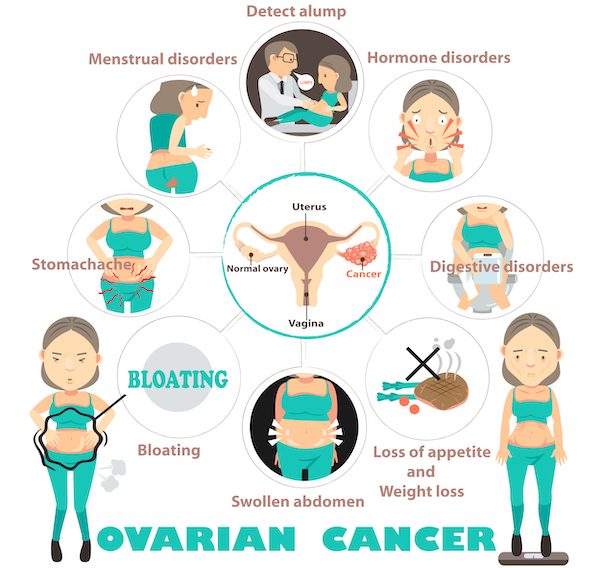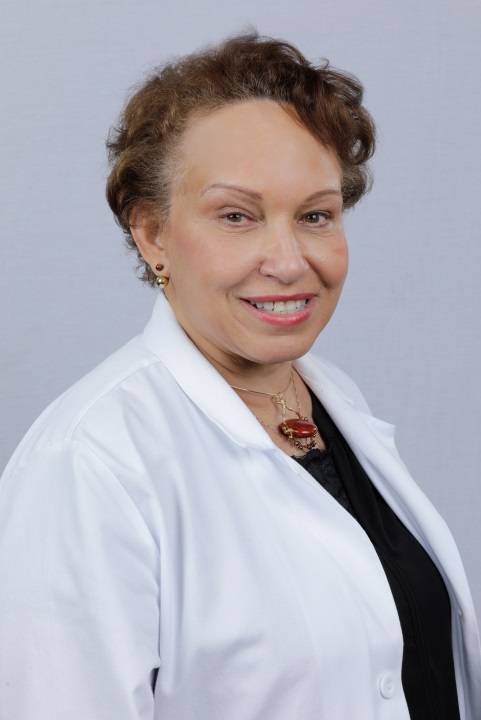If your body could tell you something was wrong, would you listen?
Of course. But what if the body was silent? That’s been the problem with ovarian cancer—its symptoms have always been vague. By the time cancer is detected, it likely has spread.

There is no specific screening test for ovarian cancer, which makes paying attention to your body essential. Women will describe having insidious symptoms which can easily be confused with indigestion. They describe struggling with bloating and abdominal distension for months. They in retrospect report intermittent constipation which made them chronically uncomfortable but which they felt was something they had to live with. They describe a slow and ongoing loss of appetite. There is often no pain or signs of bowel obstruction until the disease is advanced. When you add the first and second reasons together, you have a very aggressive high-grade tumor which grows and spreads without symptoms until it has occupied a lot of space in the abdomen and spread away from its site of origin.

American Cancer Society (ACS) and other groups recommend that you see your doctor if you experience:
- Bloating
- Pelvic pressure or stomach pain
- Trouble eating or feeling full quickly
- Trouble urinating or the urge to urinate right away
While these symptoms frequently don’t indicate cancer, those that persist for weeks could be cause for concern.
Women who have a mother or sister that have been diagnosed with the disease, have an increased risk for some types of ovarian cancer. But most cases occur in women without a close-family history. Scientists believe that approximately 15% of cases of ovarian cancer are linked to defective genes (mutations). These mutations are passed from parent to child. However, this does not mean that every child inherits the defective genes.
Ovarian cancer, as well as some other cancers, is linked with aging. The older you are the more likely you are to develop the disease. As women, we experience menstruation, childbirth and cyclical changes that involve cells division and cell death. As the cell divides, the DNA must be replicated and there is a risk for an error. The longer we live, the more likely there is of a mistake (mutation) occurring.
According to ACS, other risk factors of ovarian cancer:
- Being overweight or obese
- Smoking
- Hormone replacement therapy post-menopause
- Fertility treatments
- Having children later or never having a full-term pregnancy
Even though this disease is not entirely preventable, there are some things that can help reduce your risks:
- Maintain a healthy weight
- Consuming pungent vegetables such as garlic and ginger
- Eating dark green vegetables like kale, spinach and broccoli
- Oral contraceptives, when taken for five or more years, can decrease your risk by about 50%
- Tubal ligation or hysterectomy gynecologic surgeries
Ovarian cancer can be difficult to recognize, but if cancer is suspected, doctors can use a variety of tests for confirmation. This includes pelvic exams, ultrasound, CT scans, MRIs, tissue biopsies and blood tests. Gynecologic oncologist can perform surgery to decrease tumor size, intraperitoneal chemotherapy and other lifesaving procedures.
Over the last few years, several new targeted treatments have been developed thanks to the perseverance of doctors, researchers and patients. PARP (poly ADP-ribose polymerase) inhibitors are indicated for treatment of advanced ovarian cancer. They include drugs such as Olaparib, Rucaparib and Niraparib. Use of these can help repair damage to DNA inside cells. There is great optimism supported by hard data that these drugs will change the story for those 50% of patients who die from this disease. Regardless of the research, there is always hope.
Know Your Risk
Parrish Cancer Center provides the services and technology you expect from a world-class cancer center. Healthaware is a series of free Health risk assessment (HRA) tools provided by Parrish Medical Center that bring awareness and information about your risk for various health conditions. Each free risk assessment will take about seven minutes to complete.
Text the word “Health” to the number 321-204-1966 and you can also take the assessment on your phone. At the end, you will receive personalized, confidential information that will help you learn your risk. Visit parrishhealthcare.com/healthaware for more information.

Oncology Physician
Patricia Deisler, MD
Board Certified Oncology/Internal Medicine
Patricia Deisler, MD, has practiced medicine since 1996, after receiving her medical degree from Weill Cornell School of Medicine in New York.
She completed her internal medicine residency training at St. Luke-Roosevelt Hospital Center and Hematology-Oncology Fellowship at Cornell University Medical College.
She welcomes new patients and accepts most insurance plans.
Dr. Deisler is conveniently located in the Parrish Cancer Center in Titusville, located at 845 Century Medical Dr.
Please call (321) 529-6202 for an appointment.











